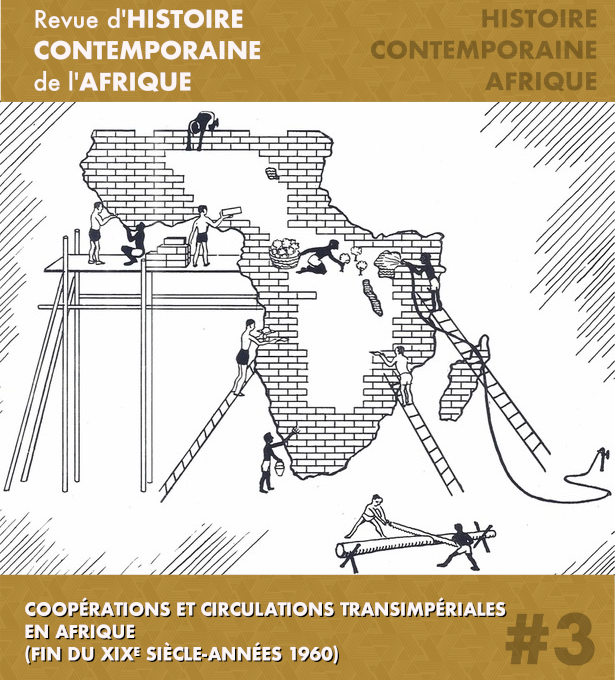Recherche et développement dans les colonies portugaises d’Afrique
L’impulsion de la coopération scientifique interimpériale (1950-1962)
DOI :
https://doi.org/10.51185/journals/rhca.2022.0303Mots-clés :
Afrique, coopération interimpériale, empire colonial portugais, développement, scienceRésumé
Cet article analyse l’impact de la collaboration entre les puissances coloniales présentes en Afrique australe sur le champ scientifique portugais. Selon nous, depuis 1950, la participation portugaise à la Commission de coopération technique en Afrique au sud du Sahara (CCTA) et à son organe consultatif, le Conseil scientifique africain (CSA), a été décisive dans l’évolution de la politique scientifique pour les colonies portugaises. D’une part, cette participation a conduit à la création de plusieurs organismes de recherche et à la formation de spécialistes, d’autre part, elle accélère l’institutionnalisation des instituts de recherche scientifique en Angola et au Mozambique et, enfin, elle ouvre de nouvelles opportunités d’emploi aux scientifiques et techniciens de la métropole et des territoires coloniaux. La coopération transimpériale fut, dans le cas portugais, un mécanisme pour induire rapidement l’expansion et le renforcement de la communauté scientifique nationale, confrontée à ses propres faiblesses et contraintes, avec des effets au-delà du départ du Portugal de la CCTA en 1962
Références
Ágoas Frederico et Castelo Cláudia (2019), « Ciências sociais, diplomacia e colonialismo tardio: a participação portuguesa na Comissão de Cooperação Técnica na África ao Sul do Saara (CCTA) », Estudos Históricos, 32(67), pp. 410-428.
Barth Volker et Cvetkovski Roland (2015), « Introduction. Encounters of Empires: Methodological Approaches », in V. Barth et R. Cvetkovski (dir.), Imperial Co-operation and Transfer, 1870-1930: Empires and Encounters, Londres, Bloomsbury Academic, pp. 3-34.
Castelo Cláudia (2012), « Investigação científica e política colonial portuguesa: evolução e articulações, 1936-1974 », História, Ciências, Saúde – Manguinhos, 19(2), pp. 391-408.
Castelo Cláudia et Ágoas Frederico (2020), « Inter‐African cooperation in the social sciences in the era of decolonization: A case of science diplomacy », Centaurus, pp. 1-17.
Clarke Sabine (2007), « A Technocratic Imperial State? The Colonial Office and Scientific Research, 1940-1960 », Twentieth Century British History, 18(4), pp. 453-480.
Coghe Samuël (2015), « Inter-Imperial Learning and African Health Care in Portuguese Angola in the Interwar Period », Social History of Medicine, 28(1), pp. 134-154.
Cooper Frederick (1997), « Modernizing bureaucrats, backward Africans, and the development concept », in F. Cooper et R. Packard (dir.), International Development and the Social Sciences, Berkeley, University of California Press, pp. 64-92.
Cooper Frederick (2010), « La modernisation du colonialisme et les limites de l’empire », Labyrinthe, 35(2), pp. 69-86.
Cooper Frederick et Packard Randall (1997), « Introduction », in F. Cooper et R. Packard (dir.), International Development and the Social Sciences, Berkeley, University of California Press, pp. 1-41.
Costa J. Carrington da (1958), « A investigação científica e o ultramar português », Boletim da Sociedade de Geografia de Lisboa, 76(4-6), pp. 121-140.
Gruhn Isebill (1971), « The Commission for Technical Co-operation in Africa, 1950-1965 », The Journal of Modern African Studies, 9(3), pp. 459-469.
Havik Philip J. (2020), « Regional cooperation and health diplomacy in Africa: from intra-colonial exchanges to multilateral health institutions », História, Ciências, Saúde – Manguinhos, 27(supl.), pp. 123-144.
Havik Philip J. et Monteiro José Pedro (2021), « Portugal, the World Health Organisation and the Regional Office for Africa: From Founding Member to Outcast (1948-1966) », The Journal of Imperial and Commonwealth History, 49(4), pp. 712-741.
Hodge Joseph M. (2007), The Triumph of the Experts: Agrarian doctrines of development and the legacies of British colonialism, Athens, Ohio University Press.
Hodge Joseph M., Hödl Gerald, Kopf Martina (2014), Developing Africa: Concepts and Practices in Twentieth-Century Colonialism, Manchester, Manchester University Press.
Jerónimo Miguel Bandeira et Dores Hugo Gonçalves (2020), « Enlightened Developments? Inter-imperial Organizations and the Issue of Colonial Education in Africa (1945-1957) », in D. Matasci, M. B. Jerónimo et H. G. Dores (dir.), Education and Development in Colonial and Postcolonial Africa, Springer International Publishing, pp. 237-262.
Jerónimo Miguel Bandeira et Monteiro José Pedro (dir.) (2017), Internationalism, Imperialism and the Formation of the Contemporary World, Londres, Palgrave Macmillan.
Junta de Investigações do Ultramar (1959), « Relatórios das actividades dos organismos dependentes da Junta de Investigações do Ultramar », Anais, 14.
Krige John (dir.) (2019), How Knowledge Moves: Writing the Transnational History of Science and Technology, Chicago/Londres, The University of Chicago Press.
Lindner Ulrike (2015), « New Forms of Knowledge Exchange Between Imperial Powers: The Development of the Institut Colonial International (ICI) Since the End of the Nineteenth Century », in V. Barth et R. Cvetkovski (dir.), Imperial Co-operation and Transfer, 1870-1930: Empires and Encounters, Londres, Bloomsbury Academic, pp. 57-78.
MacKenzie John M. (2015), « European Imperialism: A Zone of Co-operation Rather than Competition? », in V. Barth et R. Cvetkovski (dir.), Imperial Co-operation and Transfer, 1870-1930: Empires and Encounters, Londres, Bloomsbury Academic, pp. 35-54.
MacVety Amanda Kay (2018), The Rinderpest Campaigns: a Virus, its Vacines, and Global Development, New York, Cambridge University Press.
Matasci Damiano (2020), « Internationalising Colonial Knowledge. Edgar Barton Worthington and the Scientific Council for Africa, 1949–1956 », The Journal of Imperial and Commonwealth History, 48(5), pp. 892-913.
Ribeiro Orlando (1950), Problemas da investigação científica colonial, Lisbonne, Junta de Investigações Coloniais.
Tilley Helen (2011), Africa as a Living Laboratory: Empire, Development, and the Problem of Scientific Knowledge, 1870-1950, Chicago/Londres, The University of Chicago Press.
Unger Corinna R. (2018), International Development: A Postwar History, Londres, Bloomsbury Academic.
Wagner Florian (2015), « Private Colonialism and International Co-operation in Europe, 1870-1914 », in V. Barth et R. Cvetkovski (dir.), Imperial Co-operation and Transfer, 1870-1930: Empires and Encounters, Londres, Bloomsbury Academic, pp. 79-104.
Wilhelm Lola (2020), « “One of the Most Urgent Problems to Solve”: Malnutrition, Trans-Imperial Nutrition Science, and Nestlé’s Medical Pursuits in Late Colonial Africa », The Journal of Imperial and Commonwealth History, 48(5), pp. 914-933.
Téléchargements
Publiée
Comment citer
Numéro
Rubrique
Licence
Certains droits réservés 2022 Claudia Castelo

Ce travail est disponible sous licence Creative Commons Attribution - Pas d’Utilisation Commerciale 4.0 International.





